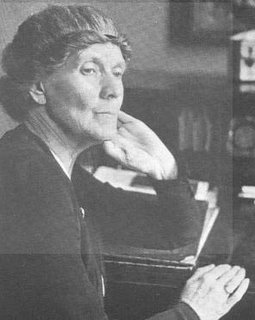
I am frequently amazed by how much stuff I don’t know. My thanks to fellow OU student, Dermot O’Rourke, who has this week introduced me to a writer I had previously never heard of – Ivy Compton-Burnett. Her biography certainly makes very sad reading, but I love the sound of her writing.
Dermot is writing his MA dissertation this year and Ivy is his subject. He speaks passionately about her and his enthusiasm having infected me, I’ve added Ivy to my ever growing ‘to read’ list. So many authors, so little time.
As a result of chatter about Ivy and Henry James, I also got into conversation with Dermot about the academic versus the creative mind. Dermot said that:
“If all the literature departments, in every university in the world, were shut down tomorrow it would be no great loss. The creative, not the academic, mind is what is important.”
And my immediate reaction was:
“You're so wrong though. Why do you think creative people create? They simply want to communicate and 'thinking' people are absolutely essential to that dialogue - they bring the words on the page to life by engaging with them.”
Dermot still holds to his original argument and I’m thinking over the whole question of what academe gives us of value before responding again. Is it enough for the student of literature to have intelligence, curiosity, awareness and enthusiasm (supported and informed by the opinions of other like minded and non-academic people who have ‘gone before’) to enable them to take what is of value from literature, or does the literature student need the academic world as well if they are to succeed? Mmm, I suspect I still disagree with Dermot…

3 comments:
Goodness but that's a tough argument.
To my mind, without the critical viewpoints there are elements that we might not be aware of, in some of the 'great literature' of the English speaking world and beyond.
Of course, this brings up huge issues of 'canons' of writing - but that's the point; as we go along, more and more great literature, like your Ivy, gets added, which is wonderful.
Personally I'm caught between a need to diminish my own ignorance in matters literary, and a need to prove my worth, by acquiring a standard of education, that rewards all this extra 'acquiring'.
Originally, I had thought it would complement my writing. But it seems it has taken over! Instead of writing poems, I'm writing essays, that require taking a stand. That's not a bad thing, since I think that once I have the study completed, I shall have a different perspective to write about.
That's not to say that I wrote in a vacuum before, it's more that, instead of writing about a football field in my locale, I'd rather write about the greeness of global grass...
Your friend postulates a false dichotomy based on a narrow definition of the word "creative".
While creative works can often be not accademic, there can be a certain amount of creativity in accademic work. "Creative" does not always equate with "ficticious".
Just as poetry and prose share many of the same elements and can be a times indistiguishable, so can
be the case with accademic and creative works. It would not be too hard to find examples of accademic pieces that are very creative and creative works that incorporate accademic principles within them.
As for his statement,
“If all the literature departments, in every university in the world, were shut down tomorrow it would be no great loss. The creative, not the academic, mind is what is important.”
My suggestion would be to frame your argument not terms of "why" questions such as "Why would it be
great loss if the world's university shut down?", "Why is the academic mind just as important as the creative mind?
Instead pose them as
"How" questions "How (in what ways) would it be great loss if the world's university shut down?
"How is the academic mind just as important as the creative mind?"
As Michele Le Doeuff puts it (and I paraphrase) "why" questions often
lead to flights of metaphysical fancy and whimsy,whereas "How questions leave us entrenched in the material world, in the very
issues we face.
And I have found that the process of finding the answer to "how" often reveals the answer to "why".
Post a Comment